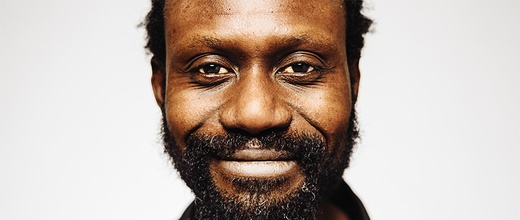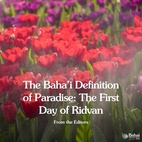The views expressed in our content reflect individual perspectives and do not represent the official views of the Baha'i Faith.
If you met my dear friend Gail, you’d quickly see that she is a Muslim woman. She wears a hijab, eats halal and does her best to follow Muhammad’s teachings.
For Gail, her faith centers her life—but that’s not all she is, and it doesn’t constitute her entire identity. She’s African-American by birth and culture, and her father was one of the country’s first and most prominent black architects. She’s now the CEO of the architectural firm he founded. She’s a mom, with kids she’s proud of; and she has long volunteered to work in social causes, especially homelessness. To top it off, Gail has three siblings—one Jewish, one Christian and the other a Baha’i. (Can you imagine those family reunions?)
I see Gail as a good example of a major change that has happened in our world. For millennia, most people have defined themselves solely by their belief systems, with their identities revolving only and entirely around those beliefs and the cultures they engendered. Now, the Baha’i teachings say, we all have the freedom to break away from those narrow, inherited traditions, dogmas and strictures, and independently determine our own identities:
No man should follow blindly his ancestors and forefathers. Nay, each must see with his own eyes, hear with his own ears and investigate independently in order that he may find the truth. The religion of forefathers and ancestors is based upon blind imitation. Man should investigate reality. – Abdu’l-Baha, Divine Philosophy, p. 25.
God has created in man the power of reason, whereby man is enabled to investigate reality. God has not intended man to imitate blindly his fathers and ancestors. He has endowed him with mind, or the faculty of reasoning, by the exercise of which he is to investigate and discover the truth, and that which he finds real and true he must accept. He must not be an imitator or blind follower of any soul. He must not rely implicitly upon the opinion of any man without investigation; nay, each soul must seek intelligently and independently, arriving at a real conclusion and bound only by that reality. – Abdu’l-Baha, The Promulgation of Universal Peace, p. 291.
This kind of independence, which Baha’u’llah’s teachings encourage, has had a profound effect on humanity, making the world a very different place than it was a short time ago. It has inspired autonomous thinking, created a major societal trend away from traditional organized religion, moved contemporary society in an entirely different direction, and ultimately set us free to determine our own identities—to go beyond the old labels and explore new ways of expressing who we are.
That new freedom has given us three basic choices—to stick to the old label; to find a new label and adhere to it; or to recognize the limitations of labels and transcend them.
One of the most insightful voices on this question of modern identity, the author and philosopher Kwame Anthony Appiah, recently published a new book called The Lies that Bind, and in it he warns us:
We all have many things to do “out there” in the world. And the problem is not walls as such but walls that hedge us in; walls we played no part in designing, walls without doors and windows, walls that block our vision and obstruct our way, walls that will not let in fresh and enlivening air.
The modes of identity we’ve considered can all become forms of confinement, conceptual mistakes underwriting moral ones. – The Lies that Bind, p. 218.
The Baha’i teachings explain that this kind of identity-seeking—basically, exchanging one label for another—misses the point:
In the contingent world there are many collective centers which are conducive to association and unity between the children of men. For example, patriotism is a collective center; nationalism is a collective center; identity of interests is a collective center; political alliance is a collective center; the union of ideals is a collective center, and the prosperity of the world of humanity is dependent upon the organization and promotion of the collective centers. Nevertheless, all the above institutions are in reality, the matter and not the substance, accidental and not eternal—temporary and not everlasting. – Abdu’l-Baha, Baha’i World Faith, p. 419.
Every limiting and restricting movement or meeting of mere personal interest is human in nature. Every universal movement unlimited in scope and purpose is divine. The Cause of God is advanced whenever and wherever a universal meeting is established among mankind.
Therefore, endeavor that your attitudes and intentions … be universal and altruistic in nature. Consecrate and devote yourselves to the betterment and service of all the human race. Let no barrier of ill feeling or personal prejudice exist between these souls. – Abdu’l-Baha, The Promulgation of Universal Peace, p. 448.
So the Baha’i teachings say that identity, ultimately, emanates from our inmost spirit. We build our identities, not from external realities, but from universal spiritual ones, from what we do with our lives to help and serve others. Baha’is believe that your true identity comes from your active love for humanity and your relationship to the Divine—not your class, culture, country, color or creed:
In the eyes of God all races, tribes, sects and classes are equal. He sees no difference in them. The only difference existing between men in God’s sight is in the degree of service. The lovers of humanity, these are the superior beings, of whatever race, creed or colour. There are some who shine as lamps and there are others who rise like stars in the sky of humanity. In short, the only difference existing between men is this, there are earthly men and heavenly men. God does not ask if a man comes from the East or West, from the North or South. – Abdu’l-Baha, Star of the West, Volume 2, pp. 3-4.

















Comments
Sign in or create an account
Continue with Facebookor